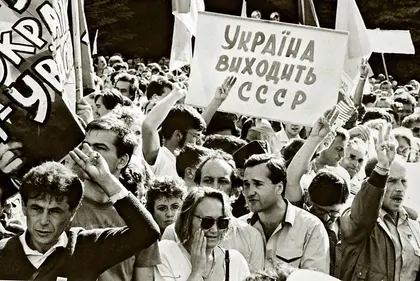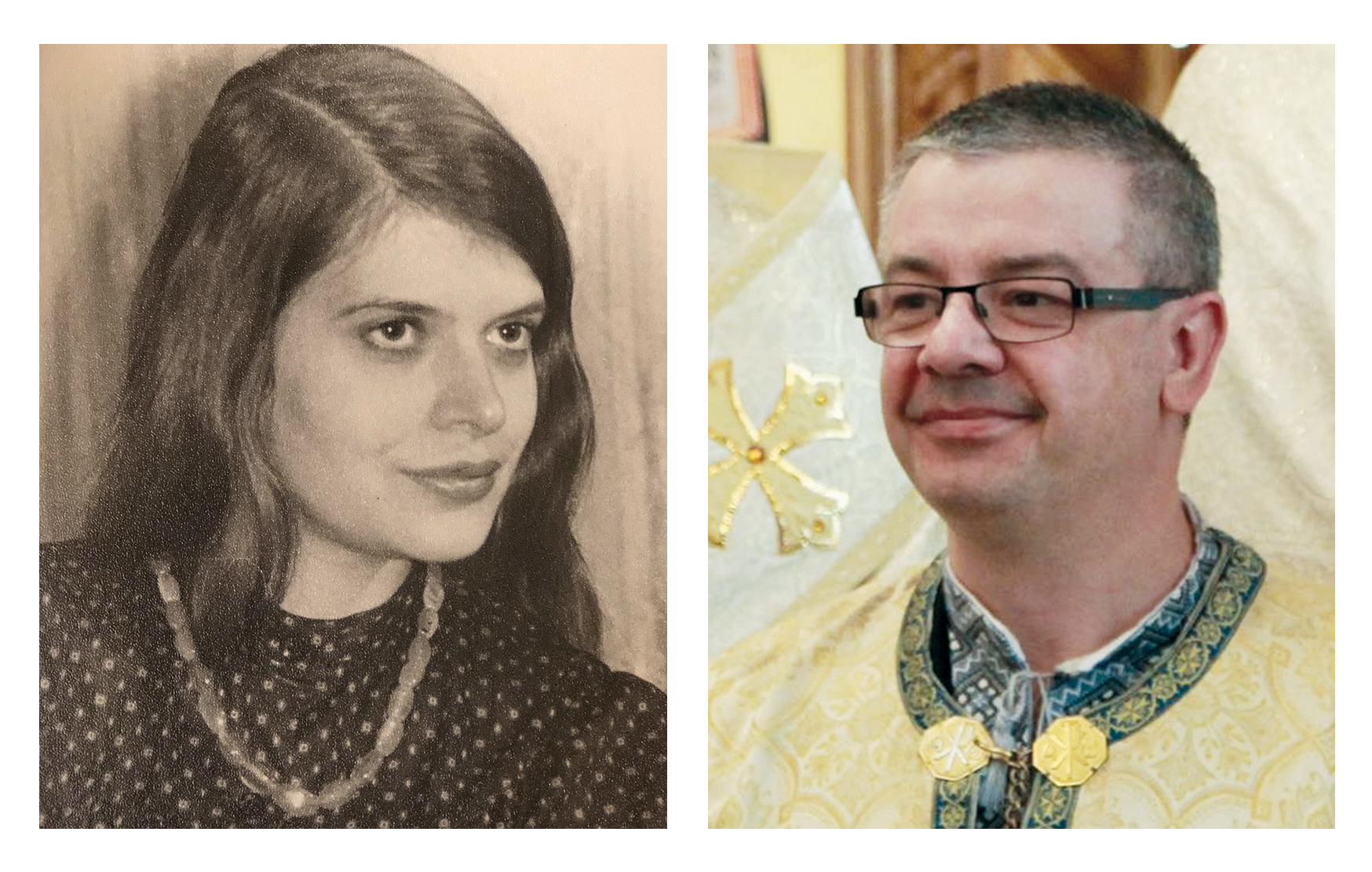EDMONTON, Canada — In June 1991, Tatyana Vorobyova received a ticket that changed her life.
Vorobyova, then a 35-year old Soviet citizen, left Kyiv and departed to Canada to study art management at Grant MacEwan College in Edmonton, Alberta. She was the first foreign student from a Soviet country. A mere two months later, her home country underwent a historical change: After more than 70 years of Soviet rule, Ukraine became independent and put an end to the Soviet Union.
JOIN US ON TELEGRAM
Follow our coverage of the war on the @Kyivpost_official.
Vorobyova witnessed it all from Canada. She never thought she would end up on the other side of the ocean witnessing historic events unfold in Kyiv. Her life in Ukraine had been well-organized: Vorobyova used to work as an assistant in foreign relations at the Ukraine’s Union of Composers. In 1989, they launched the first musical festival in Kyiv headed by renowned Ukrainian composer Ivan Karabyts. Since Vorobyova was fluent in English, German and Polish, she took care of all the foreign guests.
“We communicated a lot and then they left,” she says. The next year’s festival brought two Canadians to Kyiv. Those were George Naylor, dean of Grant MacEwan College’s performing and fine arts program, and Roman Petryshyn, the director of the Ukrainian Resource and Development Centre at the same college.
Change in air
It was 1990 and the situation in Ukraine became unstable. The Ukrainian Student Union and the Student Brotherhood of Lviv openly protested against the last communist government of Soviet Ukraine. They were not satisfied either with life in the Soviet Union or with the Ukraine’s then communist parliament: they were against Ukrainian boys being drafted and sent by the government to ‘hot spots’; they wanted democratic changes and the aim was to proclaim principles of independence.
“Next to the Kyiv Conservatory there was a campus and a tent. There were rallies, demonstrations … (which later were dubbed as the Revolution on Granite),” Vorobyova recalls. Grant MacEwan’s Naylor enjoyed her work. “At that time in Canada there was a specialty called Art Management which we didn’t have in Ukraine. Mr. Naylor invited me to study in Canada and said they would raise money for my education,” Vorobyova said. “Honestly, I didn’t believe it. I had elderly parents and a small daughter.”
However Canadian composers, the College, and Shevchenko Foundation in Winnipeg raised money for Vorobyova’s ticket to Canada, tuition and accommodation in Edmonton. Upon her arrival, she volunteered at musical and theatrical festivals until a manager of one festival told Vorobyova to call an office in Toronto where someone with knowledge of Russian was needed.
“When I called, it turned out that it was an international department of CBC (Canadian Broadcasting Corporation) Radio. At that time, their Russian-language newsroom was helping the Ukrainian department to find a reporter who knows Ukrainian,” Vorobyova said. The CBC gave her an assignment and eventually invited her to work for the station.
“Because of my job at the radio station, I had a chance to follow all the events in Ukraine. I was absolutely in awe when I found the news on Verkhovna Rada proclaiming our independence,” Vorobyova said. “We celebrated with Ukrainian Canadians, there were lots of Ukrainian flags and people wore vyshyvankas.”
Vlodko Boychuk
Elsewhere that same day, 18-year-old Vlodko Boychuk was busy working in his backyard in Edmonton when he learned about the news from home.
“I was already in Canada for 1.5 years, when I found out about Ukraine‘s independence. It was one of those surreal moments in my life which I will never forget,” Boychuk, now a teacher in a Ukrainian bilingual program, one of the oldest in western Canada, recalls. “I heard it on the radio newscast as I was cutting grass. I remember stopping the lawnmower and saying the Lord’s prayer right after I heard the news. It was an exhilarating experience as I never thought that I will live long enough to see Ukraine as an independent country.”
Securing independence
In August 1991, parents of Ihor Broda, a first generation Canadian, went to visit Ukraine. It was the trip of a lifetime: Broda’s father, Oleksa Broda, had never returned to Ukraine since 1941 when he had been taken by the Nazis as forced labour to Germany and ended WWII as a political prisoner on the verge of starvation, in the Dachau concentration camp. His future wife — Stephania Broda had also been taken as forced labor. After the war they met in a displaced persons’ camp, where they married and subsequently immigrated to Canada. Before independence, Stephania had only visited Ukraine once in 1970.
“As the attempted coup of Aug, 19, 1991 unfolded in Moscow, our family became concerned that my parents were now in danger,” Ihor, a retired Edmonton lawyer, says. “They phoned two days later and said that everything was calm in Ukraine and they were in no danger. They said they were returning to Kyiv to catch a flight back to Canada.”
On Aug. 24, 1991 they were in Kyiv when Ukraine declared indeendence. They heard the news on television in their hotel room and phoned to break the news to the family. “They couldn’t believe their good fortune to be in Kyiv on the eventful day and were sad that they had to return to Canada on a flight the next day,” Broda says. “I picked them up at the airport, and they said that things were calm in Ukraine when they left.”
By the time they returned, the news had spread like wildfire in the Ukrainian community in Edmonton and throughout Canada. This was before cell phones and internet-connected computers, Broda adds, and people began calling each other to both spread the news and reflect on the joyous event. Several days later, in Edmonton, Ukrainians were celebrating the 100th anniversary of Ukrainian settlement in Canada which began in 1891. Then-Prime Minister Brian Mulroney was attending the celebration and the
National Executive of the Ukrainian Canadian Congress sought a private meeting with him to discuss events in Ukraine.
December referendum
“I was a national vice president at the time and attended a meeting with the prime minister along with other members of the National Executive,” Broda says. “We inquired whether Canada would grant official recognition and support of Ukraine’s independence. Prime Minister Brian Mulroney was already aware that there was a referendum planned in Ukraine for Dec. 1, 1991.”
Broda remembers Mulroney indicating that if Ukrainians approved the Declaration of Independence in the referendum, Canada would immediately grant official recognition and move to establish diplomatic relations with Ukraine.
On Dec. 1, 1991, with a turnout of at least 82 percent of eligible voters, some 92 percent voted to confirm the Declaration of Independence. The next day Canada was the second country after Poland (owing only to Canada’s day beginning six hours later) to grant official recognition to Ukraine.
The National Executive of the Ukrainian Canadian Congress began preparations for the establishment of a Ukrainian Embassy and Consulate in Ottawa. They formed a fundraising committee where Broda became chairman. “We raised some two million dollars and assisted Ukraine in acquiring a consulate, an official residence for the Ambassador (the late Levko Lukianenko) and contributed money to defray the costs of operating the Embassy,” Broda says. “Canada has been a stalwart friend and ally of Ukraine throughout her independence, to the present time.”
You can also highlight the text and press Ctrl + Enter





